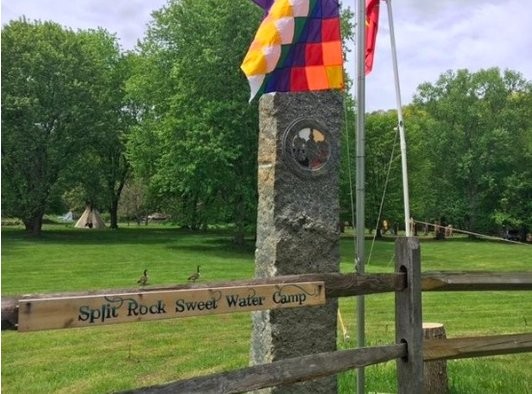
The Ramapough tribe filed a complaint to stop $12,500 per day fines, which it says are really a form of religious discrimination.
The Ramapough Lenape Nation has made changes to its federal lawsuit against the Township of Mahwah and a group of homeowners to focus it more on what the tribe says its ongoing fight is really about — religious discrimination.
“The amendment is trying to streamline and focus the lawsuit to what we see as the real issue — religious discrimination against the Ramapough Lenape tribe,” said Darius Charney, an attorney for the Center for Constitutional Rights, which joined the lawsuit in August.
The legal complaint was originally filed in May by the tribe to stop fines totaling $12,500 per day from being waged by the township against the tribe for using a 14-acre tribal prayer ground.
The land in question, known as Split Rock Sweet Water, is located on Halifax Road, along the Ramapo River at the entrance to the Ramapo Hunt and Polo Club — an enclave of million dollar homes.
The property was gifted to the tribe in 1995 by the developer of the homes and has been used as a prayer site since before Christopher Columbus arrived in America, tribe members have said.
It drew complaints from neighbors and town code enforcement officials in December 2016 when the tribe erected teepees, a prayer circle and other structures. Mahwah sued the tribe in May 2017 for violating zoning laws. And a Superior Court judge in November 2017 found the tribe liable for 39 of 43 violations — a decision the tribe has appealed.
The federal lawsuit, filed by the tribe against Mahwah and the Polo Club, originally contained 11 counts but was trimmed down to seven after a nuisance claim against the Polo Club, a forced eviction claim against both the township and homeowner’s group and a two other counts that the tribe’s lawyers deemed repetitious were removed, Charney said.
“The nuisance one is really a state law claim and we wanted to focus on the constitutional issues here,” he said.
Among them, Charney said, “both the town and Polo Club are conspiring together to discriminate against the tribe.”
Calls to Township Attorney Brian Chewcaskie and an attorney for the homeowners were not returned.
Listen to NJ.com on Alexa, or via a daily podcast
Mahwah, last week, settled a lawsuit with the Attorney General’s Office in which it was accused of targeting Orthodox Jews with two ordinances. The township did not admit wrongdoing and was not fined, although it would have to pay the state $350,000 if it engages in unlawful conduct within the next four years.
Asked if the timing of the amendment to this federal lawsuit from the tribe had anything to do with the Attorney General’s settlement, Charney said no.
“The timing was solely due to the fact that the judge told us we had until Sept. 21” to file papers in response to the defendants’ motion to dismiss the case, he said.
The township, homeowners group and the tribe’s attorneys are expected to meet Thursday for their first mediation session, per the judge’s instructions.
Ramapough Chief Dwaine Perry said said he is hoping for a “balanced and fair settlement.”
The fines being incurred by the tribe, meanwhile, now total “a little over a million dollars,” Perry said, adding, “I find it incredible that we’re being fined for assembling to pray on our own land.”
If a settlement can’t be reached during mediation, the Ramapoughs are ready to go to court.
“It would be great to reach a resolution where all the parties are satisfied,” Charney said. “But if that’s not possible we’re prepared to litigate this case to vindicate the tribe’s rights.”
The Ramapough Lenape Nation, which consists of about 5,000 members living around the Ramapo Mountains in Bergen and Passaic counties in New Jersey and Rockland County, New York, were recognized by the state of New Jersey in 1980 as a Native American tribe, but are not recognized federally.
Allison Pries may be reached at apries@njadvancemedia.com. Follow her on Twitter @AllisonPries. Find NJ.com on Facebook.
http://www.nj.com/news/index.ssf/2018/09/ramapoughs_amend_mahwah_lawsuit_to_focus_on_discri.html